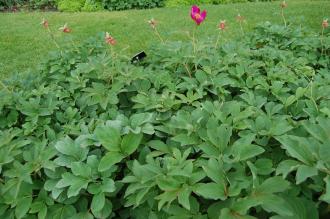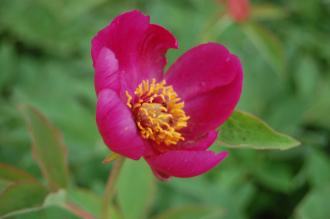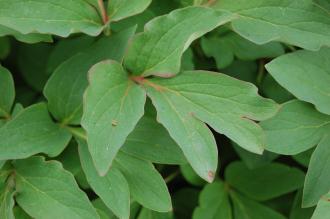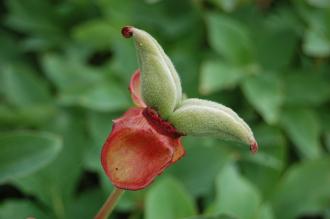
Paeonia officinalis (22/05/2016, Kew Gardens, London)
Position: Full sun to partial shade
Flowering period: Late spring
Soil: Moist, well drained
Eventual Height: 70cm
Eventual Spread: 70cm
Hardiness: 8a, 8b, 9a, 9b, 10a
Family: Paeoniaceae

Paeonia officinalis Flower (22/05/2016, Kew Gardens, London)
Paeonia officinalis is a deciduous herbaceous perennial with a clump forming habit. Its mid green leaves are divided into up to nine ovate leaflets are and up to 25cm long. Its red single hermaphrodite flowers are bowl shaped, appear in the leaf axis terminally and are up to 13cm across.
Paeonia officinalis, commonly known as Common Peony or Garden Peony, is native to the south of Europe, including Italy, France and Switzerland. In its native habitat it grows at forest margins and meadows.

Paeonia officinalis Leaf (22/05/2016, Kew Gardens, London)
The etymological root of the binomial name Paeonia is named after Paeon, a Greek physician of the gods who, in mythology, was changed into a flower by Pluto. Officinalis is from the Latin meaning ‘of the shop’, in reference to its use a medicine historically.
The landscape architect may find Paeonia officinalis useful as part of a herbaceous planting scheme with its attractive flowers.

Paeonia officinalis Seed Pod (22/05/2016, Kew Gardens, London)
Ecologically, Paeonia officinalis flowers are attractive to pollinating insects.
Paeonia officinalis prefers moist, deep, humus rich, well-drained soils. It tolerates most pH of soil.
Paeonia officinalis requires little maintenance. Once planted the roots of this plant should not be disturbed.

Landscape Architecture

